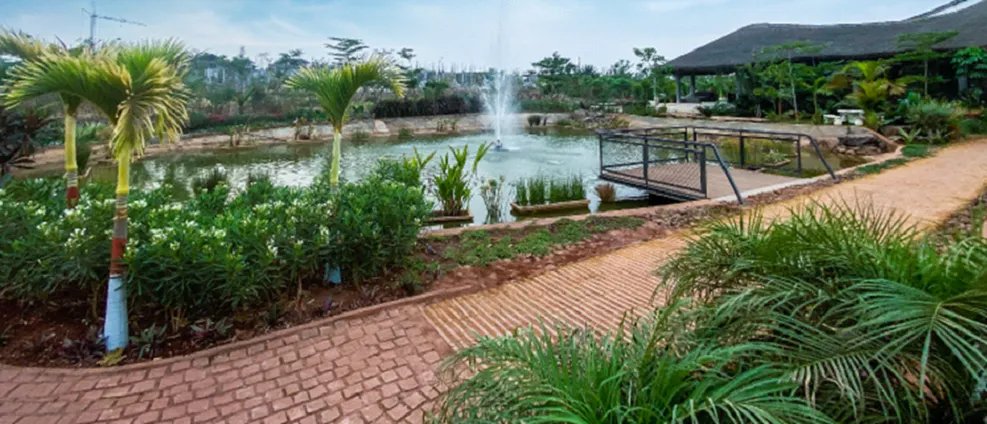 Contact us
Contact usIntent
Community
Studio Organo Concepts
About Us
Subsidaries
Studio Organo
TS RERA No.P02400003403.
TS RERA No.P02400003403.

Right from our 1st day of schooling, we have been taught the importance of plants and the role they play in our day-to-day lives. But with time, we all seem to forget its importance and take it for granted altogether. It’s funny how the people who once never hesitated to voice their love for nature now find themselves living in a concrete jungle.
Seeing trees and plants around us every day may get us thinking that there is nothing much to them. We couldn’t be any far from the truth as there are many plants which play a vital role in maintaining the ecological balance. Also, plants are one of the key resources as they provide us with food, water, medicine, oxygen, and shelter.
All this is sufficient to prove how vital plants are in maintaining a healthy ecosystem. A healthy ecosystem is a balanced ecosystem. And plants are essential to maintaining this balance. But how exactly do plants bring about this balance? Let’s find out.
How Plants Help Balance and Maintain A Healthy Ecosystem?
There is more to trees and plants than what meets the eye. Being a plant or a tree is a juggling act as you have to deal with multiple things at once without losing your balance. In addition to providing people with resources for living, they also need to cater to the habitat around them and the soil beneath them while simultaneously contributing to the climate. This is how plants help in maintaining a highly balanced and healthy ecosystem.
⦁ Prevents Soil Erosion
Every book of Environmental Students is bound to have several chapters that solely address the issue of soil erosion. When planting a tree, you must check that the soil beneath has the ability to retain water and nutrients required for plant growth. However, soil erosion leads to the soil shedding water and nutrients, leading to the loss of newly planted crops.
There is a different factor that leads to soil erosion. However, getting a plant cover has always been the constant solution in tackling soil erosion. This is because plants protect the soil from the direct effects of raindrops and splashes. In the midst of all this, they considerably slow down the movement of runoff by allowing more and more water to infiltrate the soil instead of carrying it away. Soil is one of the key substrates that help the Earth manage a large diversity of life, and it is our responsibility to protect it.
⦁ Provides A Habitat
Plants have been providing habitats for human beings and animals ever since their existence. They are responsible for the sustenance of a lot of species. One of the most common examples is the Peepal tree. Considered sacred in India, the Peepal Tree is known to have medicinal properties.
Even an old woodpecker can fetch himself some food simply by inserting his long beak inside the canopy. The majority of the native wildlife is largely dependent on plants for their very survival and sustenance. In order to ensure a balance within the ecosystem, it is crucial to maintain a healthy ecosystem.
In simple words, plants act as a source of food for humans and animals alike. A glitch in this system will largely disrupt the entire food chain.
Reduce the Risk of Air Pollution
Despite the whole world slowly moving towards a greener initiative, air pollution continues to remain a critical issue throughout. Although battery-powered automobiles are in full swing, a sustainable alternative fuel source is yet to be found. Moreover, there is a wide range of pollutants and other greenhouse gases that pose a direct threat to the climate and environment.
This is where trees come in handy, as any area with a dense green cover acts as a sink for these pollutants to seep in. All of this has the capability of improving the air quality index and reducing the risk of air pollution. Planting trees near urban and industrial zones are proven to be the most effective in absorbing the hazardous gases and pollutants present in the atmosphere.
⦁ Benefits Our General well-being
Up until now, we have seen how plants contribute highly to the environment and the overall climate around. In addition to that, the University of Technology, Sydney has provided measurable evidence that highlights the different effects plants have on our health and mental wellbeing.
These studies further indicate that people located closer to the woodlands or dense green spaces exhibit a better quality of physical health and mental well-being and tend to have a superior quality of life. Moreover, exercises done within these green spaces are known to aid highly in improving self-esteem, controlling anxiety, and warding off signs of depression.
The Bottom Line

Irrespective of what we read in the tabloids, it is our collective responsibility to ensure that we maintain a healthy ecosystem while simultaneously spreading awareness about the importance of a healthy ecosystem. Plants are the very means of sustenance of human beings and animals alike, and they are the ones upon which the ecological balance depends primarily upon.
Connect with us to learn more about "Rurban Life", “eco-habitats” and how they are helping the residents of our eco-habitats have access to sustainable lifestyle while living close to nature in our eco-habitat Communities.
